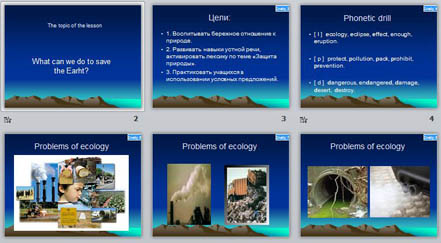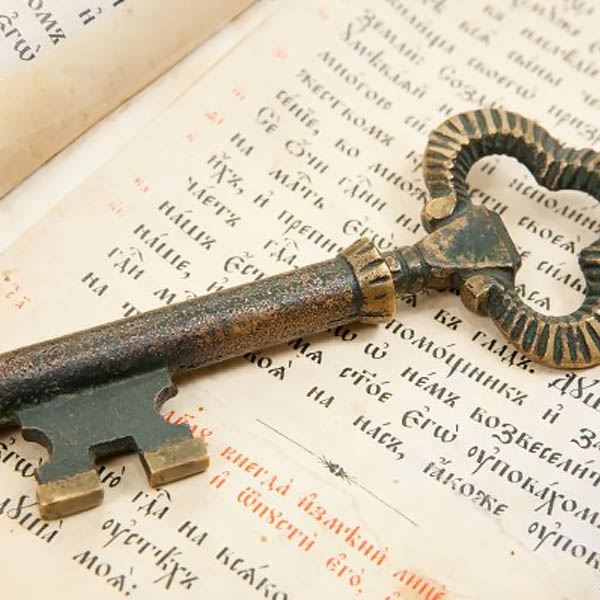Цели:
1. Воспитывать бережное отношение к природе.
2. Развивать навыки устной речи, активировать лексику по теме «Защита природы».
3. Практиковать учащихся в использовании условных предложений.
4. Формирование правильного представления о поведении на природе.
Оборудование:
Видеопроектор
Ноутбук
Презентация по теме урока
Аудиозаписи
Видеоролики
Тест по теме урока
1. The starting point of the lesson.
Good afternoon, boys and girls. Today we continue discussing the ecological problems and ways out of the situation.
2. The phonetic drill.
As usual, we start with the phonetic drill. Please repeat after me:
[ I ] – ecology, eclipse, effect, enough, eruption.
[ p ] – protect, pollution, pack, prohibit, prevention.
[ d ] – dangerous, endangered, damage, desert, destroy.
Thank you, well done.
3. The main part of the lesson.
- Now I want you to watch the video clip and then to answer what ecological problems are there.
(clip)
- so, what ecological problems have you seen?
( pollution, dangerous technologies, lack of recycling, wars, fairs, endangered animals, drugs, crimes, dangerous diseases).
( ex. I have seen the problem of…)
-now I want you to answer the questions of the test and analyze your behavior. What do you do not to pollute the environment.

1.What does your family do with empty bottles?
A) take them to a recycling centre;
B) return them to the supermarket;
C) throw them to the rubbish bin;
2.Do you use water-based cleaning products to clean your house?
A) I don’t check;
B) I try to;
C) always;
3.How often do you use insect sprays?
A) never;
B) always;
C) seldom;
4.If you were asked to contribute to save the animal project, you would
A) give generously;
B) give a small amount;
C) refuse to give anything;
5.A local beach has been polluted with oil. You:
A) donate money for the clean up project;
B) do nothing;
C) volunteer to help with the clean up project;
6.You eat a chocolate bar in the street. What do you do with the wrapper?
A) drop it on the pavement;
B) put it in a litter bin;
C) save it for recycling;
7.Do you ever enjoy light meals that require little or no cooking like salad?
A) not very often;
B) often;
C) sometimes;
8.When you clean your teeth, you:
A) turn the tap on only when you need water;
B) leave the tap running until you have finished;
C) only use one glass of water;
1. a) 3; b) 2; c) 0;
2. a) 0; b) 2; c) 3;
3. a) 3; b) 0; c) 2;
4. a) 3; b) 2; c) 0;
5. a) 2; b) 0; c) 3;
6. a) 0; b) 2; c) 3;
7. a) 0; b) 3; c) 2;
8. a) 2; b) 0; c) 3.
18-24 KEEP UP THE GOOD WORK! YOU ARE DOING YOUR PART TO PROTECT THE ENVIRONMENT.
13-17 THERE IS SOME ROOM FOR IMPROVEMENT. CHANGE YOUR HABITS AND SOON YOU WILL BE GREEN.
0-12 YOU ARE PART OF THE PROBLEM. YOU SHOULD TRY TO BECOME PART OF THE SOLUTION.
So check your answers and I hope that results of the test make you think over about your behavior , and now tell me what people can protect, save, whom they can help.
(we can protect nature, birds, animals.
We can save rivers, lakes, oceans, seas.
We can help animals, birds.)
ok, you are right, but now it’s time to say how we can do it. At first we should learn new worlds.
Avoid – избегать, стараться не делать что-либо.
Avoid such people
Avoid talking to…/ using something
Avoid being recognized
least – наименьший, по крайней мере, последний
The least money/ time
At least
Ok, let’s do ex 52, give advice beginning with “ avoid ” to you friend.
(in written form)
-Thank you, now look at these pictures . What are they doing?
( they are planting trees, riding bikes, instead of driving a car, throwing the plastic into the recycling bin)
So, we can say that these people take care of environment and their health.
-Ok, now I want you to read the text 53 at p. 54 quickly in yourself and give me some advice how to save the Earth.
-Well done. Look at the blackboard, there sentences, that you are to continue:
If all the people decided to save our world, …
If people took cans, bottles, papers to local recycling centres, …
If people bought only the things they really needed, …
If people tried to walk or cycle instead of driving cars, …
5.If people didn’n drop litter in the country side, …
6. If people avoided buying packed goods, …
7. If people didn’t waste paper, …
The conclusion
-Now let’s make the conclusion, using this plan.
( ученики делают выводы по всему уроку).
-Today we have discussed a lot of ecological problems. I think that you will take care of our planet.
To finish our lesson I want by words of British girl Miriam Mackley.
The world needs a friend
To love and depend on
In times of trouble…
The world has hope yet
If the children let it
And if we do it right
Together we can make the world
A better place
Because the world’s best friend
Is you!
So, you’ve worked very well today. Your h|t is to learn the poem(ex 50). The lesson is over, good bye.

 Получите свидетельство
Получите свидетельство Вход
Вход





![Слайд 4 Phonetic drill [ I ] e cology, e clipse, e ffect, enough, e ruption. [ p ] protect, p ollution, p ack, p rohibit, p revention. [ d ] d angerous, en d angere d , d amage, d esert, d estroy.](https://fsd.videouroki.net/html/2013/09/15/98664275/img3.jpg)























 What can we do to save the world? (0.2 MB)
What can we do to save the world? (0.2 MB)
 1
1 909
909 170
170 Нравится
0
Нравится
0






